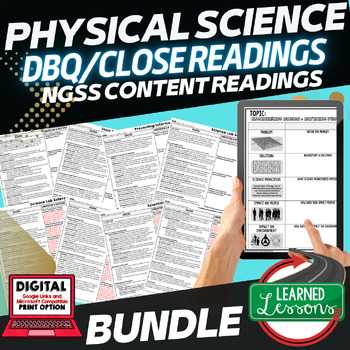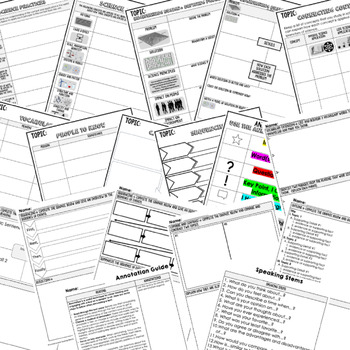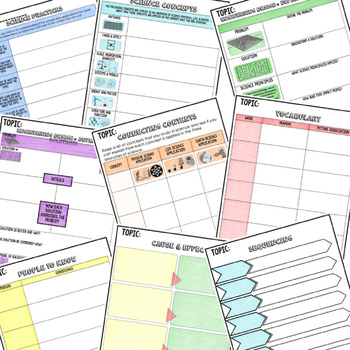Physical Science Reading Comprehension Passages and Question Google Print BUNDLE
- Zip
- Google Apps™

Products in this Bundle (10)
showing 1-5 of 10 products
Bonus
Also included in
- Physical Science Bundle | Physical Science Full Curriculum | Differentiated Activities | Google Classroom, Print & Digital Distance Learning which covers NGSS Content, Next Generation Science Standards is ALSO PART OF Earth, Life, Physical Science Integrated MEGA BUNDLE- NGSSPHYSICAL SCIENCE BUNPrice $175.00Original Price $512.25Save $337.25
Description
Physical Science reading comprehension passages and questions, Google, Science DBQ, Close Reading | NGSS ScienceTextbook Replacement | Science No Prep Activities | All Original Readings | Science Reading Comprehension Passages and Questions
Are you looking for ways to engage students in reading content? Are you looking for resources to practice using document based questions? These Physical Science DBQs and Close Reading Activities are in both Print & Google versions for Google Classroom. Each set includes original reading passages and charts to have students analyze key content.
- Also part of PHYSICAL SCIENCE BUNDLE, and NGSS BUNDLE.
- Sign up for email updates and follow me on TPT for updates.
INCLUDED:
Scientific & Engineering Practices Textbook Replacement Readings
- Teaching Suggestions
- Engineering by Design Graphic Organizers
- Investigate Like a Scientist
- Best Science Practices
- Asking Questions and Defining Problems
- Developing and Using Models
- Investigations
- Tools for Investigations
- Analyzing and Interpreting Data
- Using Math and Computation Thinking
- Constructing Explanations and Designing Solutions
- Engaging in Argument & Backing Up with Evidence
- Presenting Information
- Science Lab Safety
- Analyzing Data
- Using 5 Senses to Make Observations
- Scientific Math
- Graphing Dependent and Independent Variables
- Engineering by Design Practices
Matter Textbook Replacement Readings
- Teaching Suggestions
- Engineering by Design Graphic Organizers
- Matter Around Us
- Ways to Classify Matter
- Ways to Measure Matter
- Volume & Density
- States of Matter & Phase Transitions
- Properties of Matter
- Particle Theory of Matter
- The Water Cycle & Matter
- Mixtures & Solutions
- Elements, Compounds, Mixtures
- Physical and Chemical Properties
- Law of Conservation of Mass
- Chemical Changes
- Physical Changes
- Balancing Chemical Equations
- Matter in the World Around Us
The Water Cycle Textbook Replacement Readings
- The Water Cycle
- The Hydrosphere
- States of the Water Cycle
- Water Cycle in the Atmosphere
- States of the Water Cycle
- Water Pollution
Atoms, Elements, Compounds, Reactions Textbook Replacement Readings
- Teaching Suggestions
- Engineering by Design Graphic Organizers
- Atoms
- Protons, Neutrons, Electrons
- Atomic Structure
- Electron Cloud
- Definition of Elements
- Periodic Table
- Periods, Groups, Columns, Rows
- Atomic Mass
- Isotopes
- Ion Formation
- Ionic Compounds
- Ion Naming and Ionic Bonding
- Electron Configuration
- Valence Electrons
- Atoms & The Periodic Table
- Physical & Chemical Properties of Matter
- Law of Conservation of Matter
- Compounds and Chemical Formulas
- Chemical Reactions
- Conservation of Mass
- Types of Chemical Reactions
- Balancing Chemical Questions
- Properties of Compounds
- Rate of Chemical Reactions
- Endothermic & Exothermic
Forces & Motions Textbook Replacement Readings
- Teaching Suggestions
- Engineering by Design Graphic Organizers
- Introduction to Forces
- Types of Forces
- Gravity
- Gravitational Force
- Friction and Applied Forces
- Newton’s Laws of Motion
- Predicting Directions
- Balanced & Unbalanced Forces
- Dependent & Independent Variables
- Momentum
- Motion & Velocity
- Velocity & Speed
- Conservation of Energy
Simple Machines (Work, Power, Efficiency) Textbook Replacement Readings
- Teaching Suggestions
- Engineering by Design Graphic Organizers
- Simple Machines
- Common Simple Machines
- Simple Machines & Friction
- Types of Levers & Advantages
- Types of Pulleys & Advantages
- Types of Wheels & Axles & Advantages
- Types of Inclined Planes & Advantages
- Types of Wedges & Screws & Advantages
- Work, Power, Efficiency
- Potential & Kinetic Energy
- Conservation of Energy
Properties of Energy Textbook Replacement Readings
Energy Types Textbook Replacement Readings
- Teaching Suggestions
- Engineering by Design Graphic Organizers
- Energy
- Forms of Energy
- Kinetic Energy
- Potential Energy
- Energy Transfer & Transformation
- Thermal Energy
- Heat Transfer
- Chemical Energy
- Electrical Energy
- Light Energy
- Sound Energy
- Energy Origination
- Conservation of Energy
- Energy in Everyday Life
- Energy Transformations and Transfers
- Alternative Energy Sources
Electricity Textbook Replacement Readings
- Teaching Suggestions
- Engineering by Design Graphic Organizers
- Introduction to Electricity
- Electricity and Energy
- How Electricity is Produced
- Electrical Flow
- Electrical Circuits
- Conductors & Insulators
- AC v. DC
- Series & Parallel Circuits
- Electrical Measurements
- Voltage, Current, & Resistance
- Generators
- Electric Power & Energy
- Electrical Safety
- Electrical Devices & Technologies
- Renewable Energy
- History of Electricity
- Cultural Impact of Electricity
Waves (Sound Waves, Light Waves, Heat Waves) Textbook Replacement Readings
- Teaching Suggestions
- Engineering by Design Graphic Organizers
- Introduction to Waves
- Wave Terminology
- Types of Waves
- Parts of Transverse Wave
- Wave Characteristics
- Properties of Sound Waves
- Sound Wave Interactions
- Light Energy Waves
- Travel Light Waves
- Law of Reflection & Refraction
- Lenses
- Electromagnetic Spectrum
- Interactions of Light Waves
- Visible Light
- Wavelength of Color
- Thermal Energy
- Heat Waves
- Conduction, Radiation, Convection
- Infrared Radiation
Energy Use and Renewal Textbook Replacement Readings
- Teaching Suggestions
- Engineering by Design Graphic Organizers
- Energy Sources
- Renewable Energy Sources
- Fossil Fuels
- Alternative Energy Sources
- Energy Consumption & Efficiency
- Pollution
- Air & Water Pollution
- Conserving Earth’s Resources
- Renewable Energy Technologies
- Sustainable Energy Practices
- Reuse, Reduce, Recycle
- Impact of Energy Overuse
- Population Growth & Carrying Capacity
- Habitat Destruction
- Climate Change
- Global Warming
Perfect for:
- Common Core support in any content area classroom.
- Background Information: Clear, concise background information.
- Test Prep: Reading and summaries to review key content.
- TEST REVIEW: Document based questions/reading practice. DBQs
- Lesson Planning: Use this packet to guide your lesson planning and ensure you include primary source reading and writing, which are common core skills.
- Substitute Lessons (No Prep): Zero prep substitute lessons that guide students through key content and reading practice.
- Bellwork or Ticket Out: Great to begin or end a lesson.
- Homework: Great homework readings to trigger content knowledge and reading practice.
FOLLOW TO GET UPDATES WHEN NEW RESOURCES ARE ADDED
Links to all MEGA BUNDLES
- Civics and Government MEGA Bundle
- Economics/Free Enterprise MEGA Bundle
- American History MEGA Bundle Colonial US to Reconstruction
- American History MEGA Bundle Western Frontier to President Trump
- World Geography MEGA Bundle
- World History Part 1 MEGA Bundle
- World History Part 2 MEGA Bundle
- English MEGA Bundle
- Physical Science MEGA Bundle
- Life Science MEGA Bundle
- Earth Science MEGA Bundle
Other Resources to Check Out:
- Social Studies MEGA BUNDLES
- Deals $2 and Under
- Social Studies Word Walls
- Social Studies Anchor Charts
- Social Studies Picture Puzzles
- Social Studies Games
- Social Studies Cut and Paste
- Social Studies DBQs and Speeches
- Social Studies Timelines
- Social Studies Choice Boards
- Social Studies Graphic Organizers
- SCIENCE MEGA BUNDLES
- Deals $2 and Under
- Science Word Walls
- Science Anchor Charts
- Science Picture Puzzles
- Science Games
- Science Cut and Paste
- Science Guided Notes
- Science I Cans
- Science Choice Boards
- Science Graphic Organizers
CIVICS PAGE
US HISTORY PAGE
GENERAL RESOURCE PAGE
ELA & WRITING PAGE
PHYSICAL SCIENCE PAGE
PHYSICAL SCIENCE RESOURCE PAGE
EARTH SCIENCE PAGE
LIFE SCIENCE PAGE
WORLD HISTORY PAGE
GEOGRAPHY PAGE
LOUISIANA HISTORY PAGE
CLIPART RESOURCE PAGE
learnedlessonstpt@gmail.com
Thank you for your support! --Learned Lessons
Learned Lessons Teaching Material
learnedlessonstpt@gmail.com
#TPTDIGITAL #TPTTECH Google, 1:1, Digital






